When you live in an apartment building, incessant noises from neighbors are just a part of the package deal. Loud sounds from agitated pets, crying babies, or social gatherings can be enough to drive you mad, especially if you’re working from home.
For this reason, many apartment dwellers opt to soundproof their homes, specifically the door, which is typically where sound carries through the most. Fortunately, there are a multitude of inexpensive ways to soundproof your apartment – and without requiring your landlord’s permission.
In this post, we’ll discuss how to soundproof an apartment door and a few of the best DIY methods you can try to get you on your way to peace and quiet in no time.
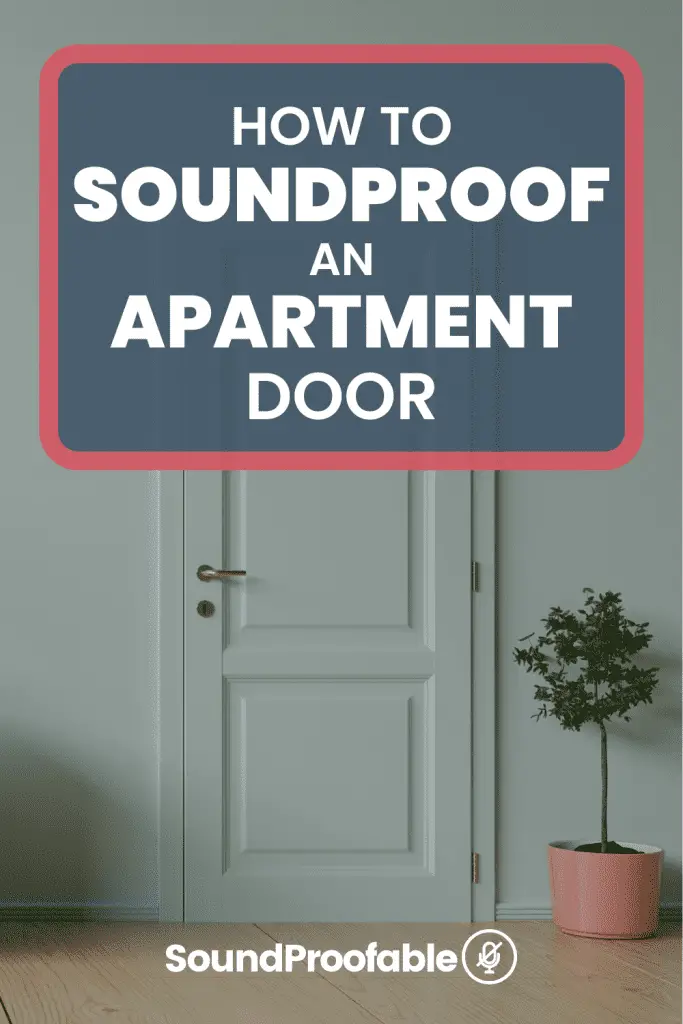
1. Use Heavy Curtains or Drapes
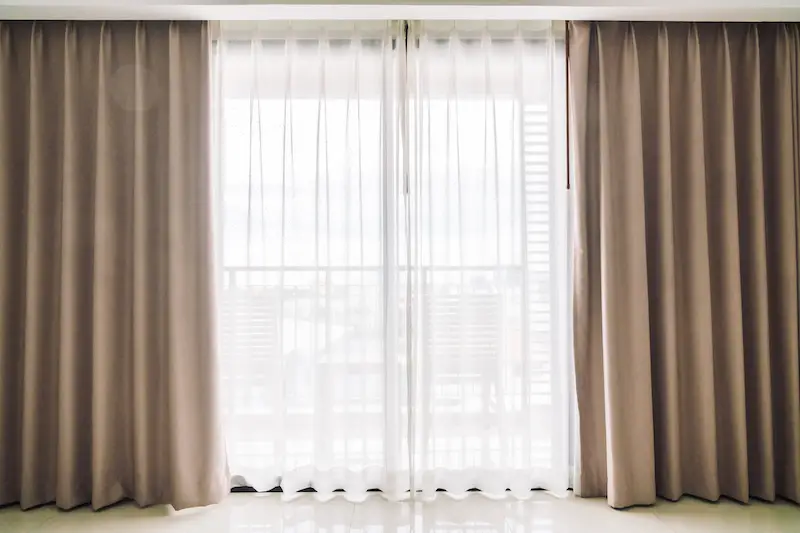
When it comes to soundproofing a door, one of the best ways is something we actually use on windows.
Hanging up heavy curtains is surprisingly helpful in eliminating the passage of loud noise through your apartment door. Successful soundproofing is all about the density of the soundproofing materials, so the heavier, the better.
Simply install a rod over the door and install the drapes that are long enough to cover the door completely. Ensure the drapes fall all the way down to cover the space between the door and the floor.
If even the heaviest fabrics aren’t quite doing the trick, try soundproofing curtains specifically engineered for absorbing unwanted sounds and deflecting them from your apartment rooms. They also come in handy for insulating your space from hot or cold temperatures.
2. Fill In Hollow Doors with Insulation
It’s common for many building owners to cheap out on hollow doors during construction. Not having a sturdy, solid door can make it difficult to sufficiently soundproof your space, so we’d recommend trying this method in conjunction with another.
By knocking on your door, you should be able to tell pretty easily whether or not it is hollow inside. If this is the case, simply use a can of insulation spray foam.
Start by drilling a few small holes about the size of the spray can nozzle and spray into the holes one by one from the bottom up. Plug each hole with tape as the foam begins to expand and insulate the door.
Remember to remove the locks and bolts before beginning this process to ensure the insulation does not affect their function.
3. Install Acoustic Panels
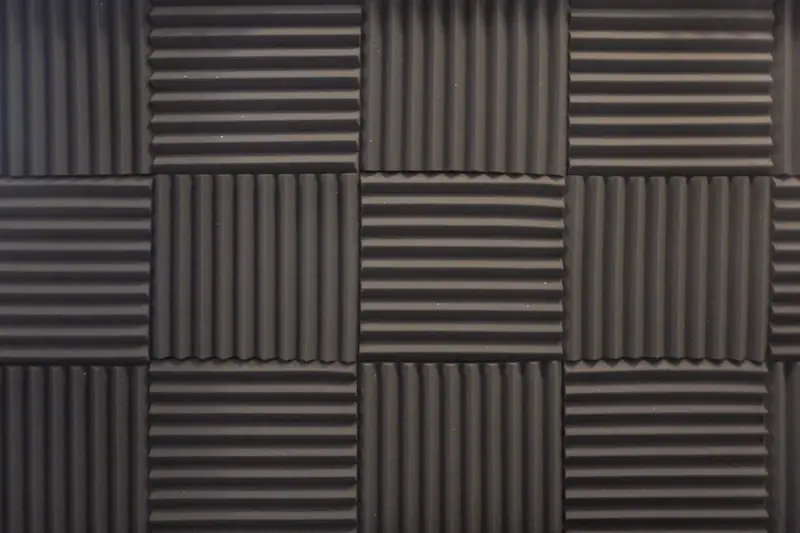
Often used in recording studios to absorb noise, acoustic panels are an excellent way to soundproof your apartment door. Sound often gets reflected off hard, shiny surfaces. Have you ever wondered why you always sing better in the shower?
Reflective surfaces bounce vibrations around and can often produce a reverberated or echo-y sound. If your door is made of metal, this could not only be the source of your problem but may also increase the level of noise you can hear.
Acoustic panels are super easy to install. Look for ones that reduce noise transfer and have a dual function to reduce echos.
4. Caulk Gaps with a Sealant
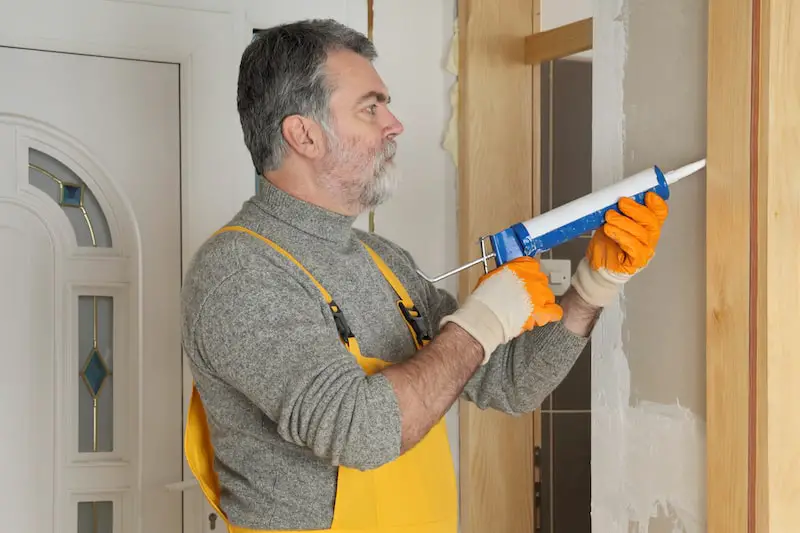
Sometimes even the smallest leak in your door can create airflow that causes sound transmission into your apartment. If this is the case for you, filling them in could make a big difference.
Sealing up the gaps with a green glue sealant works by converting sound energy into heat and reducing airflow.
Pro tip: consider using a caulking sealant around windows if you’re also experiencing noise from outside the building.
5. Hang Soundproofing Blankets
If you’re on a tight budget and just need to add some very temporary soundproofing for your apartment for then hanging some soundproofing blankets could be a quick and easy solution.
Simply get some soundproof blankets (or any type) and hang them over the door. The heavier and thicker the blanket the better as they will be better at absorbing more noise to better soundproof the apartment door.
6. Add a Mass Loaded Vinyl (MLV) Barrier to Your Door
Mass Loaded Vinyl works similarly to acoustic panels, except you’ll need to use a more heavy-duty construction adhesive to keep them sturdy and in place.
As the name suggests, MLVs have quite a lot of mass, making them excellent for blocking unwanted noise.
You can attach it to your door with a paste.. Cut a sheet of the MLV and stick it directly onto the door, making sure to cover it completely.
Note that this is a permanent solution to soundproofing your apartment door, but most landlords shouldn’t find it troublesome.
7. Use Sound-Absorbing Paint
Painting your apartment door with sound-absorbing paint can help with limiting the sound that comes through it. Although the effectiveness of sound-absorbing paint has been debatable, it’s still an option worth looking into.
Sound-absorbing paint is latex-based, making it dense enough to dull the noise coming from the other side of the door. It also provides a reflective heat barrier to the surface, which, as we explained earlier with sealants, aids in the transmission of sound waves.
Simply paint the door as you normally would, being sure to go over it with a few thick coats. For this sound treatment, your landlord might actually thank you!
8. Consider Entryway Rugs
A simple hack to reduce noise transmission into your apartment is to lay a rug directly underneath your door to cover the gap. Placing another rug in front of your door will also benefit as sound can be absorbed from both sides.
Rugs are less effective than the other suggestions on our list but are a good, quick option for short-term renters who can’t bear the noise.
9. Seal Gaps with Weather-Strips
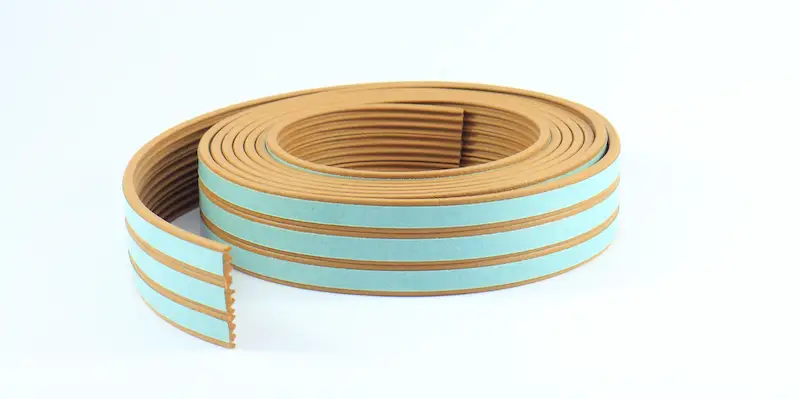
Weather-strips refer to an Adhesive Insulation Soundproofing Foam Tape that you place around the perimeter of your door. It stops air leaks from getting through the gap of your door jamb and is usually used to keep your heat in and cold weather out, or vice versa.
These weather-strips can also work as sound insulation. The better the seal of your door, the more noise you can keep out.
Most doors already have these strips, but they can get pretty worn out over time and often need a replacement. Door gaskets are a similar alternative to weather-strips that are made of metal and are a more permanent option.
10. Add Door Sweeps
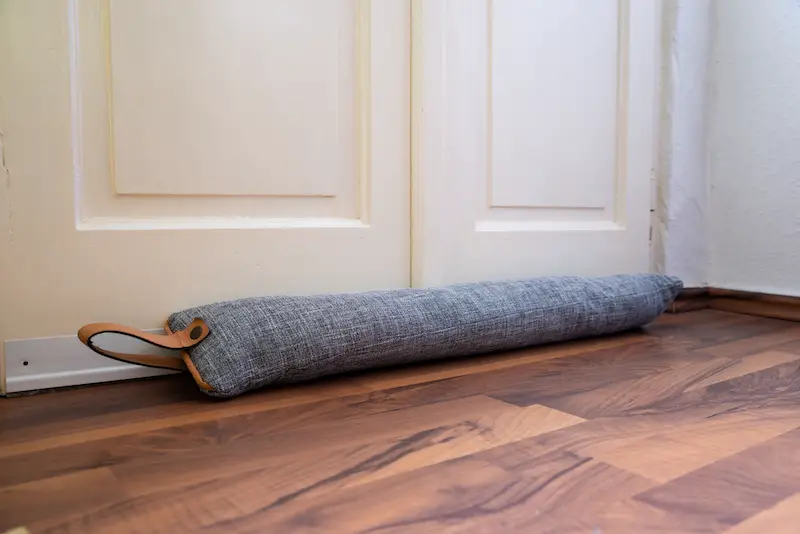
Since the gap between the floor and the door tends to be the area where sound travels through the most, the simplest solution is to cover it up. Though, the gap is necessary to stop the door from scraping the floor every time the door opens. To fill in the gap without ruining your floors, you can easily attach a door sweep.
Door sweeps are long strips typically made of metal with seals that connect to the floor. You can find them as U-shaped sweeps that slide under heavier doors or metal strips that screw, nail or staple to the bottom of the door.
This fills the gap between the door and the floor, eliminating sound transmission through the gap. Moreover, door sweeps restrict other forms of thermal energy like heat or cold, as well as bugs and dirt.
11. Automatic Door Bottom Alternative
An automatic door bottom works similarly to door sweeps but with a more modern, automatic function. It seals the small gap between the door and the floor with a rubber seal.
With the door closed, the ADB comes with an adjustable plunger that compresses against the doorframe. This automatically activates a concealed flat spring function, which allows the seal to drop and compress tightly against the floor and retract whenever the door is opened.
Automatic door bottoms are a bit bulkier and more expensive due to the mechanisms involved but are a highly effective and semi-permanent resolution for noise transmission.
12. Swap for a Solid Door
As we said earlier, hollow doors will likely transfer much more sound than sturdy, solid ones. If insulating a shallow door isn’t working or just not worth the trouble, you always have the option of purchasing and installing a more solid door.
These often come in metal or wood. Bear in mind that these doors are much heavier and difficult to install. Your landlord may have an issue upon you moving out, but they may not make a big deal of it as long as it looks nice.
Final Thoughts
Living in an apartment building can welcome lots of unwanted noise from neighbors. Loud voices, dogs barking, and babies crying all the time are enough to keep you up at night.
When it comes to soundproofing, your apartment door is often the determining factor. There are lots of ways to reduce noise transmission semi-permanently, and in some cases, it might be best to do more than one option at once to maximize their effectiveness.
Some of the options on this list are more costly than others. So, it all depends on how badly you want relief from the noise and how bad the situation is. Simple DIY hacks might do the trick, but some of the more expensive and laborious solutions could appeal to you more. After all, for some of us, you just can’t put a price on silence.
